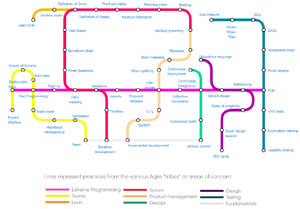Agile
Spotify Engineering Culture
Henrik Kniberg, Spotify Engineering Culture (1 and 2)
https://www.youtube.com/watch?v=4GK1NDTWbkY
FORD Production Line
Model-T Maximize production
https://www.youtube.com/watch?v=rHXgdGSttU0&t=33s
Kaizen
W. Edwards Deming / Japan / TPS Toyota Production System
Bloomberg: https://www.youtube.com/watch?v=F5vtCRFRAK0&t=66s
Pull your own work, restock what’s needed
Produce Just-in-time, reduce stock
Kanban Visualize Work (backlog, todo, in progress, done)
https://www.youtube.com/watch?v=R8dYLbJiTUE&t=25s
Identify bottlenecks
Limit Work in Progress
Kaizen: Continuous Improvement
Jidoka: Stop the line, Identify bottlenecks, Prevent defects
Don’t maximize production, if there are defects down the line
Lean
Eliminate waste
Agile Manifesto
Individuals and interactions over processes and tools
Working software over comprehensive documentation
Customer collaboration over contract negotiation
Responding to change over following a plan
Agile Principles
https://www.agilealliance.org/wp-content/uploads/2018/11/Subway-Map-to-Agile-Practices.pdf
Our highest priority is to satisfy the customer through early and continuous delivery of valuable software.
Welcome changing requirements, even late in development. Agile processes harness change for the customer's competitive advantage.
Deliver working software frequently, from a couple of weeks to a couple of months, with a preference to the shorter timescale.
Business people and developers must work together daily throughout the project.
Build projects around motivated individuals.
Give them the environment and support they need, and trust them to get the job done.
The most efficient and effective method of conveying information to and within a development team is face-to-face conversation.
Working software is the primary measure of progress.
Agile processes promote sustainable development.
The sponsors, developers, and users should be able to maintain a constant pace indefinitely.
Continuous attention to technical excellence and good design enhances agility.
Simplicity--the art of maximizing the amount of work not done--is essential.
The best architectures, requirements, and designs emerge from self-organizing teams.
At regular intervals, the team reflects on how to become more effective, then tunes and adjusts its behavior accordingly.
SAFE
Agile For Enterprise
Scrum
https://www.scrum.org/resources/what-scrum-module
PO: Understands customer requirements
Scrum Master: Facilitates the team

